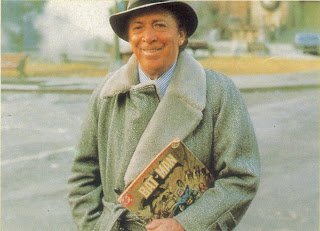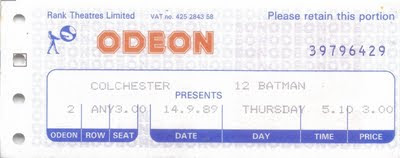 The comic book blockbuster has come to the fore in the latter stages of the 20th Century: in 1979 Superman flew in to herald the beginning of the new wave, and then ten years later came for me by far the most entertaining treatment of the Batman legend by Tim Burton.
The comic book blockbuster has come to the fore in the latter stages of the 20th Century: in 1979 Superman flew in to herald the beginning of the new wave, and then ten years later came for me by far the most entertaining treatment of the Batman legend by Tim Burton.At the time Burton seemed a choice for director that came from Left Field. He was the creator of such weird darkly comical fantasy as Pee-Wee's Big Adventure and Beetlejuice, films that almost defied description. The prospect of such a director helming a mega-budget comic strip blockbuster seemed hardly most people's first thought, and while the plot of Batman is largely a secondary consideration to the imaginative set pieces (a Burton characteristic throughout all his films), his unique visual touch dominates Batman from first frame to last. The very opening titles set the tone, the camera prowling around darkened shadowy corridors which turn out to be the outline of a giant Bat logo.
 Equally eccentric was the choice of actor to play the title role: Michael Keaton had teamed up with Burton in Beetlejuice - very much in the Jack Nicholson-type role - but here went for the slightly "harder" role of the straight-laced hero with slight psychological hang-ups thanks to his troubled childhood. Keaton did a creditable job, arguably the best of the recent Batmen (particularly with his agility in coping with the heavy costume), although generally speaking the character's psychosis remains under the mask, difficult for any actor to bring out fully therefore. This Batman is less of a caped crusader and more of an avenging angel; he observes the mugging of a tourist (Garrick Hagon) and his wife and child, but does nothing to prevent it; he merely takes his vengeance out on the offending muggers afterwards.
Equally eccentric was the choice of actor to play the title role: Michael Keaton had teamed up with Burton in Beetlejuice - very much in the Jack Nicholson-type role - but here went for the slightly "harder" role of the straight-laced hero with slight psychological hang-ups thanks to his troubled childhood. Keaton did a creditable job, arguably the best of the recent Batmen (particularly with his agility in coping with the heavy costume), although generally speaking the character's psychosis remains under the mask, difficult for any actor to bring out fully therefore. This Batman is less of a caped crusader and more of an avenging angel; he observes the mugging of a tourist (Garrick Hagon) and his wife and child, but does nothing to prevent it; he merely takes his vengeance out on the offending muggers afterwards.Early interest in this film, however, quickly intensified with the perfect choice of guest villain. Some years before, I had watched the TV series with Adam West and Burt Ward, with Cesar Romero as The Joker, and mused to myself how the perfect choice for that villain today would be Jack Nicholson. Producers Peter Guber and Jon Peters thought likewise when they were working with Nicholson in The Witches of Eastwick - as another over-the-top villain, The Devil.
Nicholson has always been a great scene-stealer, and here was a role that many people argued (and I'm one of them) that this was the role he was born for. Criticisms that his performance was too OTT (as Barry Norman put it: "with more ham than the meat counter at Sainsbury's") and pushed Michael Keaton's reserved Batman to one side are irrelevant, and incorrect I feel. These after all, are the characteristics of The Joker - he's supposed be mad, bad and over-the-top, as originally defined in the comic books.
Though his character dies at the end, Nicholson did very much walk off with the film, and a cool $3 million (a lot of money at the time) plus a percentage of all the profits, and top billing over Michael Keaton. For all the millions he raked in, nevertheless as an actor he gave his all, having a whale of a time in perhaps the most luscious of all his over-the-top performances (over the illustrious likes of One Flew Over the Cuckoo's Nest and The Shining), but never making concessions to his stardom with a huge fee for only a small appearance - unlike Marlon Brando in Superman.
The other unofficial star of Batman, besides The Joker, was a gigantic full-scale set - designed by the late,
 lamented Anton Furst, re-imagining a Gothic New York that had decayed from the ground up (influenced in part by Blade Runner), coupled with a certain amount of 1940s retro, intending to give the film a certain "timeless" feel. Creator Bob Kane (left) himself stepped onto the lot at Pinewood, and was in awe of how his Gotham City had been brought to such vivid life.
lamented Anton Furst, re-imagining a Gothic New York that had decayed from the ground up (influenced in part by Blade Runner), coupled with a certain amount of 1940s retro, intending to give the film a certain "timeless" feel. Creator Bob Kane (left) himself stepped onto the lot at Pinewood, and was in awe of how his Gotham City had been brought to such vivid life.It seems nostalgic to look back now on the dramatic summer and late autumn of 1989. 50 years after the beginning of the Second World War, its last surviving leader, Emperor Hirohito of Japan, had died; technically, the legacy of that war was also finally laid to rest when Stalin's Iron Curtain crumbled with the deposing of several Eastern Bloc countries, and the pulling down of the Berlin Wall. There was also the dramatic Tianenmen Square protest; Salman Rushdie lost his freedom to walk in the street after writing The Satanic Verses, and the rest of Britain lost Lord Laurence Olivier, the ancient Rose Theatre, The Ashes, the first of the Monty Pythons (Graham Chapman), and there was the terrible Hillsborough tragedy.
On a more personal note, the year of my 18th birthday also saw the loss of two of the Sales family : my grand uncle George Sugden, and later my grandmother Kate Ethel Sales ("Kitty" to most, and "Nan" to me) died in Octo
As part of the hype machine that summer, before the film had even opened, "Batman - The Album" came out, which was basically a series of hit spin-off songs by Prince - only a smattering of which are in the film. I had to wait a few months before being able to acquire the much stronger musical element in Tim Burton's film - the grand, stamping orchestral score by Danny Elfman.
 The second of three cinema viewings of the film that year - note the new "12" certificate, implemented to allow younger audiences in.
The second of three cinema viewings of the film that year - note the new "12" certificate, implemented to allow younger audiences in.It led to a slight overly-serious return to the dark roots of the comic book in Batman Begins (with an excellent cast), and in more recent times, the Joker's persona has taken on a very different form in the shape of the late Heath Ledger in The Dark Knight, portraying Batman's most famous adversary as a twisted, sickened individual - hardly a cha
 racter to identify with or to enjoy - unlike Joker Jack.
racter to identify with or to enjoy - unlike Joker Jack.And just for good measure, in the later months of 1989 I helped to contribute another 25 pence to Jack Nicholson's pay packet - by buying a Batman T-shirt, at a reduced-to-clear price of £5 (for which Nicholson had a 5% share in all Batman merchandise). They say the Devil has all the best tunes: Joker Jack certainly had them in this film, and made the most of them too.


